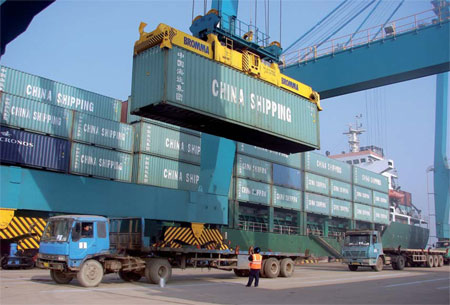Experts see bright side of lower growth target

| A cooling Chinese economy will have an impact on its trading partners, economists say. Provided to China Daily |
A lower growth target for China that Premier Wen Jiabao has set could help transform the world's second-largest economy and present opportunities to foreign businesses, economists say.
In his report to the National People's Congress on March 5, Wen set 7.5 percent as a guide for economic growth for the year. It is the lowest growth target the government has set in eight years.
The economy grew 9.2 percent to 47.16 trillion yuan ($7.47 trillion, 5.67 trillion euros) last year. The United States, the No 1 economic power, registered growth of 1.7 percent, according to the US Bureau of Economic Analysis.
In a recent report the World Bank and the State Council Development and Research Center predicted that with an average annual growth rate of 8 percent, China would be able to overtake the US as the world's largest economy by 2030.
Economists say a cooling Chinese economy will have an impact on its trading partners. A slower rate of increase of investments in infrastructure and electricity might mean fewer imports of iron ore, crude oil and other commodities, which may affect Brazil, Australia, oil-producing countries in the Middle East and other major commodity suppliers.
"Europe and America have been highly concerned about the speed of Chinese economic growth, because China has become the biggest market for European exports, particularly from Germany," said Sun Yonggang, a macroeconomic analyst with Everbright Futures Co Ltd.
"Chinese demand can make significant impact on the economic growth in Europe."
Yukon Huang, senior associate at Carnegie Endowment for International Peace and a former World Bank country director for China, said the financial markets had reacted negatively to the 7.5 percent growth target because it was below what had recently been achieved.
"The objective is not growth per se but the quality of growth," Huang said. "Moreover, this target is a floor. I fully expect actual performance to be closer to 8 percent or even slightly more."
Jon Taylor, chair and associate professor, Department of Political Science at the University of St Thomas in Houston, said Wen's target is in line with the 12th Five-Year Plan's (2011-15) goal of higher-level, higher-quality development, which sets a guide of 7 percent for the period.
"It is far better to slow down slightly, encourage domestic consumption and investments, and maintain social stability than to suffer through a hard landing," Taylor said.
Derek Scissors, an economic policy expert with the Heritage Foundation Asia, said if the 7.5 percent represents a real change, it would provide an opportunity to reduce investment growth and begin rebalancing investment and consumption.
"Rebalancing would be positive for foreign businesses and many Chinese firms as well. It would also be a long-term positive for the world economy, as China's contribution to global imbalances declines."
Zhu Zhiqun, of the department of Political Science and International Relations at Bucknell University in Pennsylvania, said as a more mature economy now, China must shift away from export-oriented growth to a more domestic-consumption driven growth model and pay more attention to even distribution of wealth so most Chinese enjoy the benefits of development.
"Premier Wen mentioned that China will promote domestic consumption. This will be welcomed by US and European businesses, because they can expect to export more to China, which in turn will contribute to US and EU recoveries by creating more jobs in these countries."
Chen Deming, minister of commerce, said on March 7 that China is the world's largest exporter, but that many overlook the fact that it is the world's No 2 importer. He estimated the country's domestic market could become the largest worldwide by about 2020.
China's exports grew 20.3 percent to $1.9 trillion last year, and imports totaled $1.74 trillion, almost 25 percent higher than in 2010. The trade surplus as a percentage of GDP has narrowed to 2.1 percent, well below the 4 percent the US and some countries have called for.
Louis Turner, associate Asia Program fellow with Chatham House in London, said the expected slowdown will encourage the Chinese authorities to see if they can stimulate domestic consumption as a counterbalance to exporting.
"This offers an opportunity to produce a more balanced economy in which exports (are) one part of it and the growth of domestic consumption is equally important."
The lower target is also a clear sign for Chinese governments at all levels, said Li Daokui, policy adviser for the People's Bank of China, the central bank, and director at the Center for China in the World Economy at Tsinghua University.
"If all local governments are still looking for high economic growth, the whole nation's development cannot be sustained. The central government hopes all governments put sustainable development in first place, ahead of pursuing short-term economic gain."
Martin Wolf, chief economics commentator of the Financial Times, said the lower growth is associated with a radical shift in the structure of growth, with a very different pattern.
"China's growth is going to have to slow. But making that adjustment to slower growth smoothly is going to be really hard. I am concerned that there may be a period when the growth is going to be well below 7.5 percent."
Steps that need to be taken include raising the interest rates to shift income to household and continue to allow real wages to rise, he said.
You may contact the writers at zhaoyanrong@chinadaily.com.cn, yuweizhang@chinadailyusa.com, and kdawson@chinadailyusa.com.
Diao Ying and Zhang Chunyan in London contributed to this story.

(China Daily 03/09/2012 page3)
Today's Top News
- Xi calls for promoting volunteer spirit to serve national rejuvenation
- Xi chairs CPC meeting to review report on central discipline inspection
- Reunification will only make Taiwan better
- Outline of Xi's thought on strengthening military published
- Targeted action plan to unleash consumption momentum
- Separatist plans of Lai slammed































